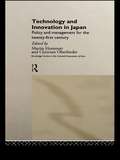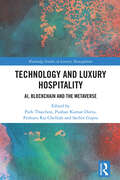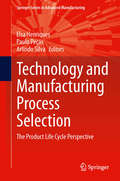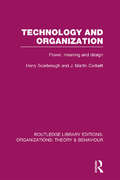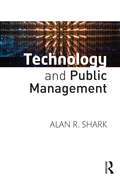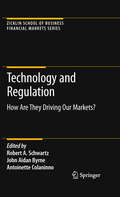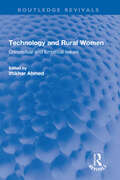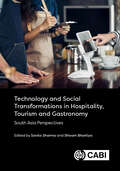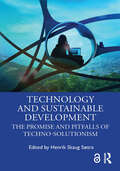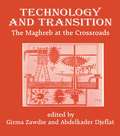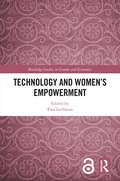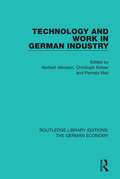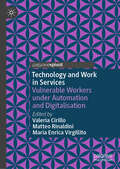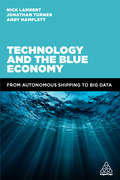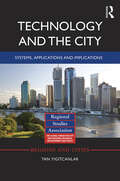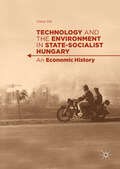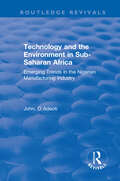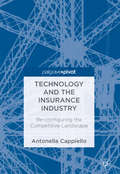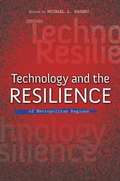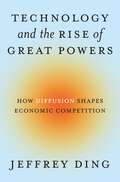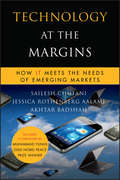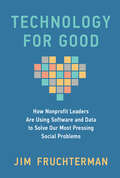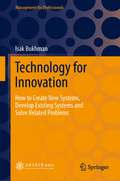- Table View
- List View
Technology and Innovation in Japan: Policy and Management for the Twenty First Century (Routledge Studies In The Growth Economies Of Asia Ser.)
by Martin Hemmert Christian OberländerThis book demonstrates that long-awaited changes to technology policy and corporate strategy are now taking place in Japan. The study also questions whether it is the programme of reform or the will and ability to implement these reforms which is new. Contributors explore the repositioning of the Japanese science and technology system on three leve
Technology and Luxury Hospitality: AI, Blockchain and the Metaverse (Routledge Studies in Luxury Management)
by Pethuru Raj Chelliah Park Thaichon Sachin Gupta Pushan Kumar DuttaThe integration of pioneering information and communication technologies has transformed the hospitality sector. This groundbreaking book delves into the transformative power of cutting-edge technologies in the world of high-end travel and accommodation. As the digital revolution continues to reshape our lives, this book offers an exclusive look at how the hospitality industry is adapting and evolving to cater to the sophisticated tastes of the modern, tech-savvy traveller.In this eye-opening exploration, readers will be taken on a journey through the latest innovations in artificial intelligence, blockchain, and the metaverse as they intersect with the world of luxury hospitality. From AI-driven concierge services and smart hotel rooms that cater to guests' every whim to the democratization of luxury experiences through blockchain-based loyalty programmes and the rise of virtual reality travel, this book reveals the extraordinary possibilities that lie ahead for the discerning traveller.With insights from international experts, this edited collection provides a comprehensive and engaging overview of the current and future trends shaping the industry and will be valuable to scholars and postgraduate researchers across the hospitality sector, innovation, and luxury management.
Technology and Manufacturing Process Selection
by Elsa Henriques Paulo Pecas Arlindo SilvaThis book provides specific topics intending to contribute to an improved knowledge on Technology Evaluation and Selection in a Life Cycle Perspectives. Although each chapter will present possible approaches and solutions, there are no recipes for success. Each reader will find his/her balance in applying the different topics to his/her own specific situation. Case studies presented throughout will help in deciding what fits best to each situation, but most of all any ultimate success will come out of the interplay between the available solutions and the specific problem or opportunity the reader is faced with.
Technology and Organization: Power, Meaning and Deisgn (Routledge Library Editions: Organizations)
by Harry Scarbrough J. Martin CorbettIn this important MBA text the authors adopt a highly integrated approach. Using the three conceptual lenses of power, meaning and design they explore fully the many different ways in which technology and organizations interact. They highlight the major debates within these competing perspectives and argue that the flow of knowledge and ideas within and between organizations is crucial in shaping technologies and organizations alike.
Technology and Public Management
by Alan R. SharkAt last, here is a textbook that covers the field of technology and public management in an informative and engaging style. Ever since the National Association of Schools of Public Affairs and Administration required greater infusion of technology into the curriculum, faculty and administrators have struggled with finding the right course materials designed specifically for the public administration environment. Technology is no longer the sole domain of an information technology office, as it has evolved into a growing set of complex tools that influence every area of government. To be effective, every public manager needs to be actively engaged in technology decisions. This textbook is designed for students of public administration at every level who need to know and understand how technology can be applied in today’s public management workplace. The book explores the latest trends in public management, policy, and technology and focuses on best practices on governance issues. Finally, this book provides real-life examples about the need for policies and procedures to safeguard our technology infrastructure while providing greater openness, participation, and transparency. Technology and Public Management covers: How information system design relates to democratic theory How and where public policy and technology intersect Skills and tools that are useful in information management, information technology, and systems dedicated for the effective flow of information within organizations Understanding the role of e-government, m-government, and social media in today's society and in public organizations Possibilities and challenges associated with technology applications within public organizations How technology can be managed, through various governance models The latest technology trends and their potential impact on public administration.
Technology and Regulation
by Robert A. Schwartz Antoinette Colaninno John Aidan ByrneTwo primary drivers have transformed the equity markets in recent years: technological advances and regulatory initiatives. How does modern, electronic technology facilitate trading, and to what extent does it present new challenges? How does regulation adjust to the changing structure of the markets, and to what extent is it itself a source of change? What are the new problems and solutions for handling institutional orders? On both sides of the Atlantic, what are the overall impacts of technology and regulation on market quality? The conference resulting in this volume brought together buyside and sellside practitioners, regulators, and academicians to address these and related issues.
Technology and Rural Women: Conceptual and Empirical Issues (Routledge Revivals)
by Iftikhar AhmedFirst published in 1985, Technology and Rural Women synthesizes the fragmented empirical evidence and the wide range of theoretical approaches on the effects of modernisation on women in the developing world. Using a multi-disciplinary methodology, empirical and sectoral overviews, and country case studies, it draws together the literature to clarify the issues and the policies. The book begins with a conceptual overview and analyses the applicability of traditional theories of technological change and impact on gender based distributional questions. It proceeds to compare the African and Asian experience, examines the African situation regionally, and then as a set of four country case studies. The authors find that the imperfections of rural factor markets have contributed to women’s concentration in labour intensive sectors, marked by low productivity and low returns. Biases in the agrarian structure and the extension services are largely responsible for the Institutionalisation of discrimination against women. Finally, the volume identifies the social, economic, and technical constraints to the diffusion of technologies relevant to rural women’s tasks. In the final chapter the book’s analysis is further refined and extended, so that its conclusions to both theory and policy making are clearly brought out, and areas of future research identified. This book is an essential read for students and scholars of labour economics, women’s studies and economics in general.
Technology and Social Transformations in Hospitality, Tourism and Gastronomy: South Asia Perspectives
by Amit Kumar Sanjeev Kumar Amandeep Khurana Omar Abdullah Kamlesh Attri Vaibhav Bhatt Sonali Chhetri R K Dhodi Rashmi Dhodi Afsheen Hassan Fatemeh Shah Hosseini Suneel Kumar Varinder Kumar Rekha Maitra Zahra Nadalipour Teena Pareek Bindu Roy Dilraj Singh Shadev Sidharth Srivastava Tahir Sufi Kuldeep VermaThis book explores the relationship between technology and social transformation in tourism, hospitality and gastronomy. It presents research and case studies, elaborating on benchmark practices adopted by tourism and hospitality professionals. In recent years, technology has transformed the tourism and hospitality industry; the chapters in this book cover areas such as guest experience and service quality, as well as operational areas such as housekeeping and waste management. Further social transformation in tourism is a result of drivers such as a growing interest in gastronomy and the use of social media; this is covered in the first part of the book. The second part outlines how communities may learn from these events. With contributions from academics, entrepreneurs, destination managers and government officials from the South Asia region, this book offers a real insight in to these areas of growing interest and provide a useful resource for those researching and studying within the areas of tourism development and hospitality.
Technology and Sustainable Development: The Promise and Pitfalls of Techno-Solutionism
by Henrik Skaug SætraTechnological change is at the core of all major disruptions in human history, and revolutions, wars, and general development are regularly connected to some sort of technological change. However, not all development is beneficial. While technology has fueled great innovations and rapid development, the notion of sustainable development has gained prominence as we now experience serious social, economic, and environmental challenges. This book examines whether technology can be used to fix the very problems caused by technology, as the various chapters examine different aspects related to how technology has brought us where we are today (which some will say is the best place humanity’s been at according to a range of metrics), and whether technology helps or hinders us in our efforts to solve the challenges we currently face. The issues discussed cover the three sustainability dimensions and include topics such as the materiality of AI, technology in education, AI for gender equality, innovation and the digital divide, and how technology relates to power, the political system, and capitalism. The chapters all build on the theoretical backdrop of technological change, sustainable development, and the UN’s Sustainable Development Goals are actively used throughout this book, both to examine how these goals capture or overlook central elements of sustainable development, and also to facilitate and create a common framework of engagement between the chapters. This book provides a novel combination of traditional theories that are explored through different case studies, providing the ground for a better understanding of how and when technology can –and cannot –be the enabler of sustainable development. It is thus an important resource for students of all disciplines, technologists, and those developing and applying new technologies. It is also a valuable resource for politicians and regulators attempting to harness the power of technology for good, while limiting its negative potential. The Open Access version of this book, available at www.taylorfrancis.com, has been made available under a Creative Commons [Attribution-Non Commercial-No Derivatives (CC-BY-NC-ND)] 4.0 license. Funded by Ostfold University College.
Technology and Transition: The Maghreb at the Crossroads
by Abdelkader Djeflat Girma ZawdieThe Maghreb countries had a promising start in economic growth after independence. For the most part they thrived on industrialisation by import substitution; but unfortunately this strategy left them with macroeconomic and structural imbalances which together have effectively constrained their ability to compete in the world economic system and to catch up with the rapidly changing global techno-economic circumstances. Issues relating to aspects of technology transfer to the Maghreb, strategies for technological and resource development and the integration of education and R&D systems with the productive systems of the economies in the region are discussed along with relevant cases from Mexico, China, South Korea, India and Bangladesh.
Technology and Women's Empowerment (Routledge Studies in Gender and Economics)
by Ewa LechmanThe near-ubiquitous spread of ICT offers unprecedented opportunities for social and economic agents, reshapes social and economic structures and drives the emergence of socioeconomic networks. This book contributes to the growing body of literature and present state of knowledge, offering the reader broad evidence on how new information and communication technologies impact women’s economic and social empowerment and hence have an impact on overall welfare creation. More specifically, it concentrates on demonstrating how ICT may become "empowering technologies" through their implementation. The book is designed to provide deep insight into the theoretical and empirical evidence on ICT as a significant driver of women`s social and economic development. Special focus is given to examining the following broad topics: channels of ICT impact on women's development; the role of ICT in enhancing women's active participation in formal labor markets; examples of how ICT encourages education, skills development, institutions development et alia, and thus contributes to women’s social and economic empowerment, as well as case-based evidence on ICT's role in fostering women’s equality. The primary audience for the book will be scholars and academic professionals from a wide variety of disciplines but mainly those who are concerned with addressing the issues of economic development and growth, social development, the role of technology progress in the context of broadly defined socioeconomic progress.
Technology and Work in German Industry (Routledge Library Editions: The German Economy #1)
by Pamela Meil Norbert Altmann Christoph KohlerGerman industry in particular is a central focus for studying technical and organizational changes in industry due to its pivotal position in international markets, its technological sophistication and its well-established training systems. Originally published in 1992, this study brings together contributions which contain both theoretical approaches and extensive empirical studies, on the manufacturing industry in Germany, including comparisons to other european countries. It looks at the developments of new technology, identifying trends in rationalization and the influences they have on organizational behaviour. As it discusses the relationships between technology and the work-force it includes discussion on flexible specialization, labour processes, union relations, small and large firms and training processes.
Technology and Work in Services: Vulnerable Workers under Automation and Digitalisation
by Maria Enrica Virgillito Valeria Cirillo Matteo RinaldiniAutomation in industrial sectors is already a well-developed topic in management, economics, and sociology literature. By contrast, this short contributed volume sheds new lights on the process of automation in the service sector, by means of a workplace case-study approach. It investigates three essential sectors largely populated by a vulnerable workforce composition, namely logistics, cleaning and healthcare, and assesses the extent to which processes of automation introduced by managerial decisions entail labour expulsion and human substitution. The result of the research shows that the most low-valued workers are among the least automatable, because of the inherent complexity their activities. Leveraging on this, the book argues the need to reconsider the essentiality of labour as determinant of its value. It will be of great interest to scholars and students of management, economics and sociology with an interest in labour, industrial relations, innovation and decent work and employment.
Technology and the Blue Economy: From Autonomous Shipping to Big Data
by Jonathan Turner Nick Lambert Andy HamflettSeventy percent of the planet is covered by water, and ninety percent of global economic trade is transported by sea. The oceans are inextricably linked with food security and the global economy. Technology and the Blue Economy examines the vital role that technology plays in developing the blue economy. It provides a clear, accessible picture of the current and future potential of technology within different sectors in the blue economy, such as offshore energy, ports and harbours, shipping, maritime surveillance and cyber security.Technology and the Blue Economy looks at the disruption of established business models through case studies of leading innovators, examining development issues, what they have learned and how they have transformed their current ways of working within their organizations. Along with actionable takeaways at the end of each section, readers will learn from and be inspired by the front-line experiences of Blue Economy innovators.
Technology and the City: Systems, applications and implications (Regions and Cities)
by Tan YigitcanlarThe interplay between smart urban technologies and city development is a relatively uncharted territory. Technology and the City aims to fill that gap, exploring the growing importance of smart technologies and systems in contemporary cities, and providing an in-depth understanding of both theoretical and practical aspects of smart urban technology adoption, and its implications for our cities. Beginning with an elaboration of the historical significance of technologies in economic growth, social progress and urban development, Yigitcanlar introduces the most prominent smart urban information technologies. The book showcases significant smart city practices from across the globe that uses smart urban technologies and systems most effectively. It explores the role of these technologies and asks how they can be adopted into the planning, development and management processes of cities for sustainable urban futures. This pioneering volume contributes to the conceptualisation and practice of smart technology and system adoption in our cities by disseminating both conceptual and empirical research findings with real-world best practice applications. With a multidisciplinary approach to themes of technology and urban development, this book is a key reference source for scholars, practitioners, consultants, city officials, policymakers and urban technology enthusiasts.
Technology and the Culture of Progress in Meiji Japan (Routledge/Asian Studies Association of Australia (ASAA) East Asian Series)
by David G. WittnerIn this book David Wittner situates Japan’s Meiji Era experience of technology transfer and industrial modernization within the realm of culture, politics, and symbolism, examining how nineteenth century beliefs in civilization and enlightenment influenced the process of technological choice. Through case studies of the iron and silk industries, Wittner argues that the Meiji government’s guiding principle was not simply economic development or providing a technical model for private industry as is commonly claimed. Choice of technique was based on the ability of a technological artifact to import Western "civilization" to Japan: Meiji officials’ technological choices were firmly situated within perceptions of authority, modernity, and their varying political agendas. Technological artifacts could also be used as instruments of political legitimization. By late the Meiji Era, the former icons of Western civilization had been transformed into the symbols of Japanese industrial and military might. A fresh and engaging re-examination of Japanese industrialization within the larger framework of the Meiji Era, this book will appeal to scholars and students of science, technology, and society as well as Japanese history and culture.
Technology and the Environment in State-Socialist Hungary
by Viktor PálThis book explains how and why the state-socialist regime in Hungary used technology and propaganda to foster industrialization and the conservation of natural resources simultaneously. Further, this book explains why this process was ultimately a failure. By exploring the environmental pre-history of communist Hungary before analyzing the economic development of the Kádár regime, Pál investigates how economic and environmental policies and technology transfer were negotiated between the official communist ideology and the global economic reality of capitalist markets. Pál argues that the modernization project of the Kádár regime (1956–1990) facilitated ecological consciousness – at both an individual and societal level – which provoked great social unrest when positive environmental impact was not achieved. Today, global issues of climate change, urban pollution, resource depletion, and overpopulation transcend political systems, but economic and environmental discourses varied greatly in the twentieth century. This volume is important reading for all those interested in economic and environmental history, as well as political science.
Technology and the Environment in Sub-Saharan Africa: Emerging Trends in the Nigerian Manufacturing Industry (Routledge Revivals)
by John. O AdeotiThis title was first published in 2002. Why do firms adopt pollution control technologies? How can environmental policy be strengthened? How can technology and industrial policies achieve green innovation? This volume critically examines whether the "stimulus-response" notion of environmental policy functions as the primary motivation for the adoption of pollution control technologies. It also questions whether technology and industrial policies can help to achieve the objective of green innovation. Interesting and well-researched empirical case studies offer important insights into the observed trends in the quantitative analysis. Focusing in particular on Nigerian industry, John Adeoti exposes the gains from and constraints upon firms' technology investment in pollution control.
Technology and the Future of Office Space
by Arthur I Segel Andrew BaumIndustry and Background Note
Technology and the Insurance Industry: Re-configuring The Competitive Landscape
by Antonella CappielloThe book analyzes the role of technology in the redefinition of the competitiveness of insurance markets. With a focus on the competitive challenges of InsurTech startup to the incumbent insurers, the book will discuss the strategic role of technology both in the development and in the distribution of insurance services and explore the customer relationship evolution following the digitalization of services offered. The book presents original theoretical and empirical contributions addressing how digitalization impacts the insurance environment and regulation, and how InsurTech development represents a threat for traditional companies, from Big Data analysis to digital devices, from personal interactivity to home automation systems development. The project’s key benefit is up-to-date analysis of the competitiveness of technology usage in the insurance field, with particular reference to the distributive variable and to the future trends of the customer relationship in the short and medium-long term. The book will be of particular interest to scholars and students of insurance and financial technology.
Technology and the Resilience of Metropolitan Regions
by Michael A. PaganoCan today's city govern well if its citizens lack modern technology? How important is access to computers for lowering unemployment? What infrastructure does a city have to build in order to attract new business? In this new collection, Michael A. Pagano curates engagement with such questions by public intellectuals, stakeholders, academics, policy analysts, and citizens. Each essay explores issues related to the impact and opportunities technology provides in government and citizenship, health care, workforce development, service delivery to citizens, and metropolitan growth. As the authors show, rapidly emerging technologies and access to such technologies shape the ways people and institutions interact in the public sphere and private marketplace. The direction of metropolitan growth and development, in turn, depends on access to appropriate technology scaled and informed by the individual, household, and community needs of the region. Contributors include Randy Blankenhorn, Bénédicte Callan, Jane Fountain, Sandee Kastrul, Karen Mossberger, Dan O'Neil, Michelle Russell, Alfred Tatum, Stephanie Truchan, Darrel West, and Howard Wial.
Technology and the Rise of Great Powers: How Diffusion Shapes Economic Competition (Princeton Studies in International History and Politics #222)
by Jeffrey DingA novel theory of how technological revolutions affect the rise and fall of great powersWhen scholars and policymakers consider how technological advances affect the rise and fall of great powers, they draw on theories that center the moment of innovation—the eureka moment that sparks astonishing technological feats. In this book, Jeffrey Ding offers a different explanation of how technological revolutions affect competition among great powers. Rather than focusing on which state first introduced major innovations, he investigates why some states were more successful than others at adapting and embracing new technologies at scale. Drawing on historical case studies of past industrial revolutions as well as statistical analysis, Ding develops a theory that emphasizes institutional adaptations oriented around diffusing technological advances throughout the entire economy.Examining Britain&’s rise to preeminence in the First Industrial Revolution, America and Germany&’s overtaking of Britain in the Second Industrial Revolution, and Japan&’s challenge to America&’s technological dominance in the Third Industrial Revolution (also known as the &“information revolution&”), Ding illuminates the pathway by which these technological revolutions influenced the global distribution of power and explores the generalizability of his theory beyond the given set of great powers. His findings bear directly on current concerns about how emerging technologies such as AI could influence the US-China power balance.
Technology at the Margins
by Jessica Rothenberg Aalami M. Yunus Akhtar Badshah Sailesh ChutaniRemain competitive by offering more accessible, affordable, and relevant information technologies that meet mass-market needsTechnology at the Margins demonstrates that by making IT more accessible, affordable, and relevant, new mass markets can be opened. Based on solid insights generated in key areas of health, education, finance and the environment, the book offers practical recommendations and insights from world leaders, innovators, practitioners and new users of emergent technologies. Offers recommendations on how companies can ensure their own competitiveness by offering more accessible, affordable, and relevant information technologies to support mass market needsSuggests practical recommendations and insights from world leaders, innovators, practitioners and new users of emergent technologiesChallenges businesses to rethink their uses of existing technologiesTechnology at the Margins will be of interest to decision makers in the private, public and nonprofit sectors who are interested in opportunities offered by IT in meeting the needs of those at the base of the worlds economic pyramid.
Technology for Good: How Nonprofit Leaders Are Using Software and Data to Solve Our Most Pressing Social Problems
by Jim FruchtermanA visionary guide to using technology for positive social change, from a MacArthur genius awardee, former rocket engineer, and passionate leader in the social enterprise movement. <p> The accepted wisdom in big business is that the only worthy ideas are ones that make a lot of money, preferably billions. But Jim Fruchterman believes there is a different path for technology. What if tech returned to its roots and made people more effective and powerful? What if the benefits of technology came to the 90 percent of humanity traditionally neglected by for-profit companies in favor of immense profits gained by focusing on the richest 10 percent? <p> In Technology for Good, Fruchterman explores that question and delivers a comprehensive how-to for leaders who want to create, expand, join, support, and improve organizations that see building technology as a key element of delivering on their social good mission. The author makes a strong case that tech is required for social change at scale. He then offers guidance on how to structure, fund, staff, manage, scale, and sustain nonprofits that leverage technology for social good. The book includes actionable, proven practices; compelling case studies of nonprofits that have “cracked the code” on tech for good; and Fruchterman’s own stories of what he has learned as a tech-for-good entrepreneur. <p> With 80 percent of the examples in the book from organizations and individuals outside the US, Technology for Good is a call to action with a genuinely global focus, blazing a path toward a future in which human beings come rightly and justly before profits.
Technology for Innovation: How to Create New Systems, Develop Existing Systems and Solve Related Problems (Management for Professionals)
by Isak BukhmanThis book offers readers a simple, attractive, detailed knowledge of TRIZ and applied TRIZ, Technology for Innovation.The genius of Genrich Altshuller and his many followers created TRIZ by using the best practices of thousands of most talented engineers and scientists, which made our technological civilization. TRIZ is a science and philosophy for new system creation and existing systems development, and related problem-solving. TRIZ helps to create the best possible solutions for even the most critical problems. TRIZ is the best we have today on our Planet for industry, technology, business, and education development.As a life philosophy, TRIZ helps realize every human being's privilege and obligation to be a creative person and live a creative and successful life. Applied TRIZ, Technology for Innovation is the process of using all parts of TRIZ combined with other proven design development methods and best practices of effective project teams for a system (products, devices, technologies, services) development and problem-solving.Technology for Innovation is applying through individual innovation Roadmaps for project creation and problem-solving.The structure and content of the book follow the standards and requirements of the curriculum for Universities. This book is a textbook for students and teachers at the university and high school level and a practical handbook for any manager, engineer, and specialist involved in product and technology development. Of course, the author believes it will also be beneficial and enjoyable to anyone with an inquiring mind, irrespective of age, and specialty.
